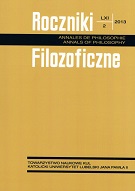Problem prawdy w filozofii Arystotelesa
The Problem of Truth in the Philosophy of Aristotle
Author(s): Tomasz DumaSubject(s): Philosophy
Published by: Towarzystwo Naukowe KUL & Katolicki Uniwersytet Lubelski Jana Pawła II
Keywords: Aristotle; truth; truth in logical understanding; extra-logical aspects of truth; discursive knowledge (episteme); theoretical wisdom (sophia); practical wisdom (phronesis); desire (orexis); art (techne)
Summary/Abstract: The article deals with the problem of truth by Aristotle. The study begins a presentation of the main cognitive dispositions, mentioned in Book VI of Nicomachean Ethics, by which man achieve the truth. A next object of analysis is the truth in logical understanding. Its “place” is the intellect performing acts of judgment, standing at the basis of discursive knowledge. Having in mind that the determinants of so understood truth are things, further investigations are focused on except logical aspects of truth. Aristotle defines them, as in the case of logical truth, on the base of human cognitive dispositions, which–apart from discursive knowledge (episteme)—include theoretical wisdom (sophia), practical wisdom (phronesis), desire (orexis), and art (techne). The actions emerging from these dispositions are also a form of cognitive agreement with reality, and consequently can be considered as a kind of truth. Despite that here as well, the truth is connected with the cognitive functions, its determinants are also real things. This leads to a crucial question of the presented article which concerns the truth of things themselves. According to Author, Aristotle does not give a directly answer, although his certain remarks touch this problem. Their examination allows better to understand the later conceptions of truth.
Journal: Roczniki Filozoficzne
- Issue Year: 61/2013
- Issue No: 2
- Page Range: 5-25
- Page Count: 21
- Language: Polish

